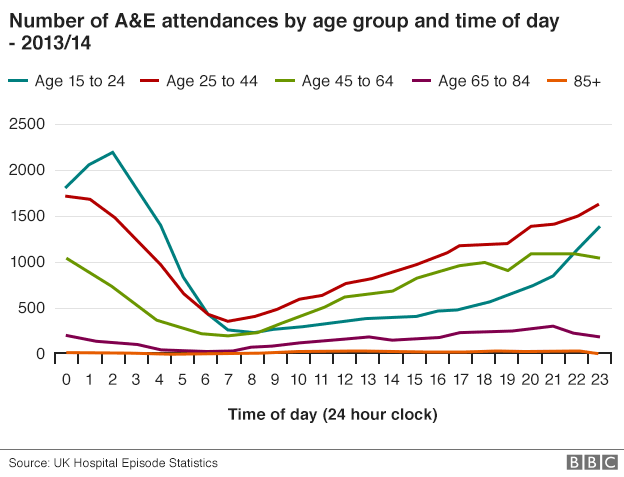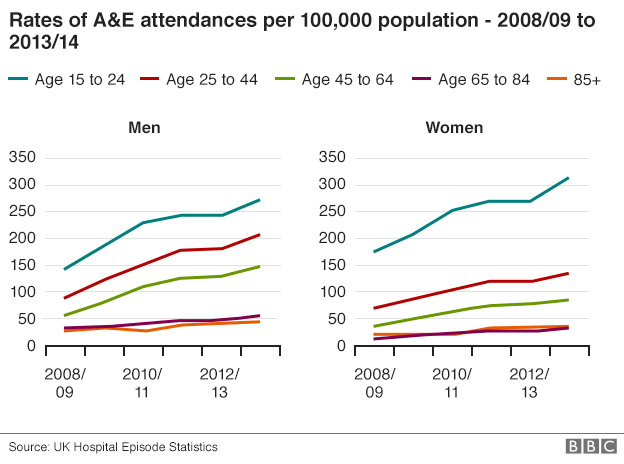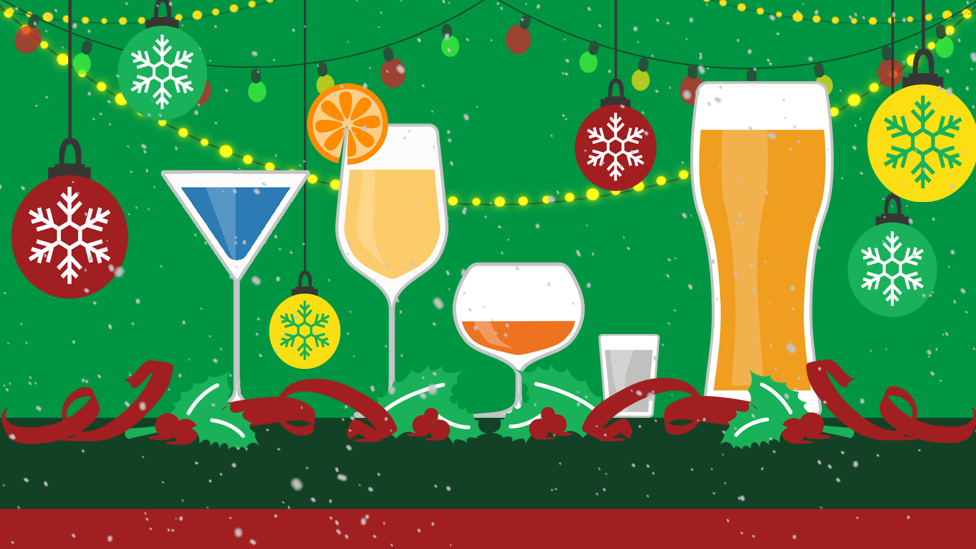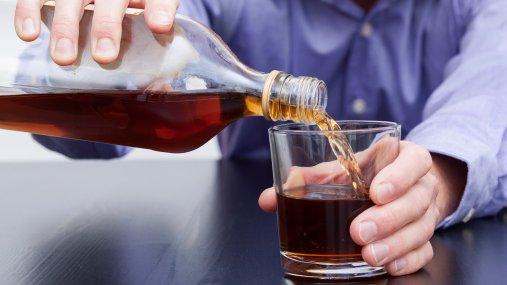A&E visits for alcohol poisoning 'double in six years'
- Published
- comments
Over consumption of alcohol is putting an increased strain on A&E departments, as Hugh Pym reports
Hospital visits for alcohol poisoning have doubled in six years, with the highest rate among females aged 15 to 19, a report has found.
Emergency admissions due to the effects of alcohol, such as liver disease, have also risen by more than 50% in nine years to 250,000 a year in England.
Rates were highest in deprived areas and in the north, and among men aged 45-64, the Nuffield Trust revealed., external
The government said it had banned the lowest priced drinks.
The Nuffield Trust said their figures were an underestimate of the impact of drinking because they did not include alcohol-fuelled falls and fights, just illnesses such as alcohol poisoning and liver disease.
Nor do they count people who come to A&E drunk and are then sent home without being treated or admitted as a patient.
Bingers and chronic boozers
Half of all A&E attendances likely to be due to alcohol poisoning - when a person drinks a toxic amount of alcohol, usually over a short period of time - took place on a Friday, Saturday or Sunday, peaking between midnight and 2am.
Three in four arrived by ambulance - putting a strain on already stretched resources, said the Nuffield Trust.

Young women aged 15 to 19 were admitted to hospital for alcohol poisoning 1.4 times as often as young men in the same age group.
A&E attendance rates that are likely to be due to alcohol poisoning and emergency hospital admissions linked to alcohol were three to four times higher in the poorest fifth of the population, the figures showed.

There were also more hospital admissions in the north of England and in urban areas.
The report also reveals the number of people actually being admitted to hospital with alcohol-related problems, such as liver disease.
Men aged between 45 and 64 made up the largest share of this group.

Alcohol poisoning
Occurs when a person drinks a toxic amount of alcohol, usually over a short period of time.
What to look for:
Confusion
Vomiting
Seizures (fits)
Slow breathing
Cold, clammy skin caused by a dangerous drop in body temperature (hypothermia)

Joint author of the report Claire Currie said: "With the Christmas party season in full swing, it's worth considering the full burden over-indulgence in alcohol is placing on our NHS, as well as the obvious human cost.
"Our research has uncovered a picture of rising and avoidable activity in hospitals, representing a stark challenge for the Health Service at a time when it's already great pressure. Hospitals alone cannot tackle this issue - the government must consider measures such as minimum unit pricing, restricting availability and limiting marketing and advertising."
In England in 2013, approximately 18% of men and 13% of women drank at a level considered to be putting them at increased risk of harm.
In 2013/14, approximately 1 in 20 emergency admissions in England were related to alcohol.
In recent years, alcohol admissions have been going down in Scotland and stabilising in Wales.
Figures from the Office for National Statistics suggest binge-drinking among young adults in Britain is continuing to fall, and more than a fifth of UK adults now say they do not drink alcohol at all.
Jackie Ballard, of Alcohol Concern, said middle-aged and older people drinking above recommended limits, often in their own homes, were of particular concern.
"These are the people who tend to require the most complex and expensive health care due to the mental and physical problems caused by drinking too much and alcohol's impact on the ageing body.
"Alcohol is linked to over 60 medical conditions and unless society and the government starts to take this seriously and acknowledges the health problems too much alcohol can cause, the situation will only get worse and the NHS will continue to strain under the burden of alcohol harm."
A government spokesman said: "People should always drink alcohol responsibly - very busy ambulance services and A&E staff can do without this extra demand.
"The government has taken action to tackle cheap alcohol by banning the lowest priced drinks and we are already seeing fewer young people drinking on a regular basis."
- Published22 December 2017

- Published8 January 2014
